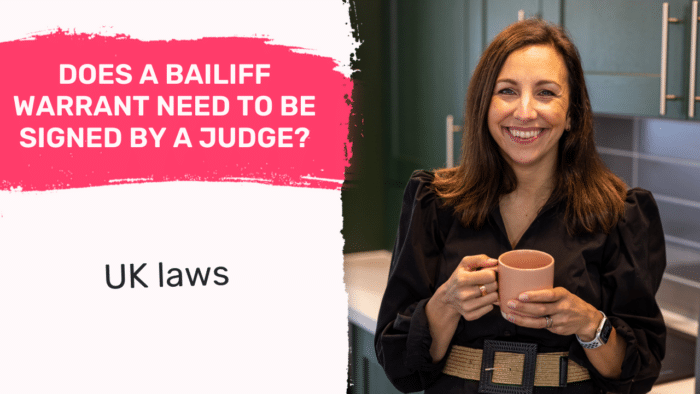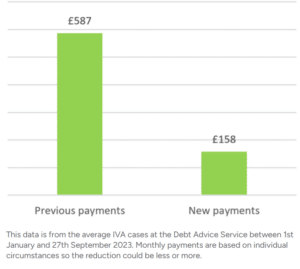Does a Bailiff Warrant Need to Be Signed by a Judge?
For free & impartial money advice you can visit MoneyHelper. We work with The Debt Advice Service who provide information about your options. This isn’t a full fact-find, some debt solutions may not be suitable in all circumstances, ongoing fees might apply & your credit rating may be affected.

For free & impartial money advice you can visit MoneyHelper. We work with The Debt Advice Service who provide information about your options. This isn’t a full fact-find, some debt solutions may not be suitable in all circumstances, ongoing fees might apply & your credit rating may be affected.
Are you worried about debt and the bailiffs who may come knocking? Don’t worry, you’re not alone. Our website gets over 12,000 visitors each month who are also seeking advice on this topic.
This article will help you understand:
- When bailiffs might come for a debt
- If you must pay them
- The powers of County Court bailiffs
- What a warrant of control is and how it can affect you
- Ways to lower your repayments
We know your fears about not being able to pay a debt and the stress of dealing with bailiffs or debt collectors; some of us have been in your shoes. We’re here to help.
Ready to learn more about bailiff warrants and whether they need to be signed by a judge? Let’s dive in!
Do court warrants need to be signed?
Yes, the bailiff warrant should be signed and it should also have an official stamp from the County Court that issued it.
You can request to see the warrant when they turn up at your door. If you don’t want to open the door to them, you could always ask them to show you through a window.
Bailiffs aren’t allowed to climb through windows, so it doesn’t matter too much if the window is slightly open to enable conversation.
Do court bailiffs need a warrant with a wet ink signature?
Yes, the County Court bailiff warrant will be an original with a wet ink signature.
High Court bailiffs can show you a copy of the warrant or Writ on a device, and you therefore wouldn’t see a wet ink signature on the Writ in these situations.
How a debt solution could help
Some debt solutions can:
- Stop nasty calls from creditors
- Freeze interest and charges
- Reduce your monthly
A few debt solutions can even result in writing off some of your debt.
Here’s an example:
Situation
| Monthly income | £2,504 |
| Monthly expenses | £2,345 |
| Total debt | £32,049 |
Monthly debt repayments
| Before | £587 |
| After | £158 |
£429 reduction in monthly payments

If you want to learn what debt solutions are available to you, click the button below to get started.
What is a warrant of entry?
A Warrant of Entry is required when an energy company wants to come to your home to disconnect service (very rare!) or when they want to install a pre-payment metre.
Does a warrant of entry need to be signed?
Yes, this warrant should also be signed by a judge.
Thousands have already tackled their debt
Every day our partners, The Debt Advice Service, help people find out whether they can lower their repayments and finally tackle or write off some of their debt.

Natasha
I’d recommend this firm to anyone struggling with debt – my mind has been put to rest, all is getting sorted.
Reviews shown are for The Debt Advice Service.
What happens after a warrant of control is issued?
Once a Warrant of Control has been issued, bailiffs have the power to come to your home and seize goods if you refuse to pay. However, it’s not that quick and simple. Some steps and time limits need to be satisfied before bailiffs can come knocking.
The first thing the bailiffs need to do is send you a Notice of Enforcement Letter. This is a letter to your address and is exactly how it sounds. The letter will ask you to pay the debt, and if you don’t you should expect them to visit you at home.
I might add… bailiffs charge high fees for their work. Just by sending this letter, you will be stung with an extra £75 added to your debt. It’s best to deal with it at this stage if possible.
Before bailiffs can then use the Warrant of Control to visit you at home, they must wait seven clear days after issuing you with the Notice of Enforcement Letter. This should give you enough time to brush up on your legal rights and prepare for their visit if you can’t pay.
How can you stop County Court bailiffs?
You have three options to stop County Court bailiffs after a Warrant of Control has been issued. You can:
- Pay the debt before they come to your home, i.e. within seven days of receiving the Notice of Enforcement Letter.
- Inform the bailiffs when you’re a vulnerable person who cannot be visited at home. Citizens Advice can help you determine if you qualify to use this loophole.
- Apply for the CCJ to be set aside and to have all enforcement action stopped. Sometimes you might get the CCJ cancelled for various reasons.
Do you have to let bailiffs in?
No, you’re not obligated to let bailiffs into your home.
But it’s also not a good idea to ignore them as they charge you for each visit they make. You should try to communicate with them from an upstairs window or through a letterbox.
What powers do County Court bailiffs have?
There is a lot of confusion online regarding the powers of bailiffs. Here is just one of many examples of people asking for clarity online:

Source: https://forums.moneysavingexpert.com/discussion/comment/14106875#Comment_14106875
Bailiffs can:
- Send you a letter asking you to pay
- Visit you at your home at least seven days after their initial letter. They can do this between 6am and 9pm on most days except Sundays.
- Enter your home peacefully, which means they cannot break down doors or prevent you from locking your door. They can enter open and unlocked doors only.
- Ask you to pay or agree to a payment plan (not obligatory to be offered by the bailiff) where your goods are used as security. If you miss a payment they could enter your home to collect the goods using a locksmith.
- Seize assets owned by the debtor. These are then stored and sold at an auction to clear the debt
However, a bailiff cannot do any of the above unless they have a court warrant that gives them permission to do so. It’s not their job title that allows them to take your possessions, it’s the court warrant they carry.
Avoid more bailiff dealings!
Dealing with bailiffs is stressful and can cause mental health issues. It’s best to avoid having to deal with them altogether, which is why I’ve posted my free How to Get Out of Debt guide.
Read this for support dealing with existing debts, and stop them from materialising into bailiff action.
Does a bailiff warrant need to be signed? (Quick recap)
Yes, a County Court bailiff warrant should be signed and you can ask to see it when bailiffs show up. You can ask to see it through a window to avoid having to open a door.



